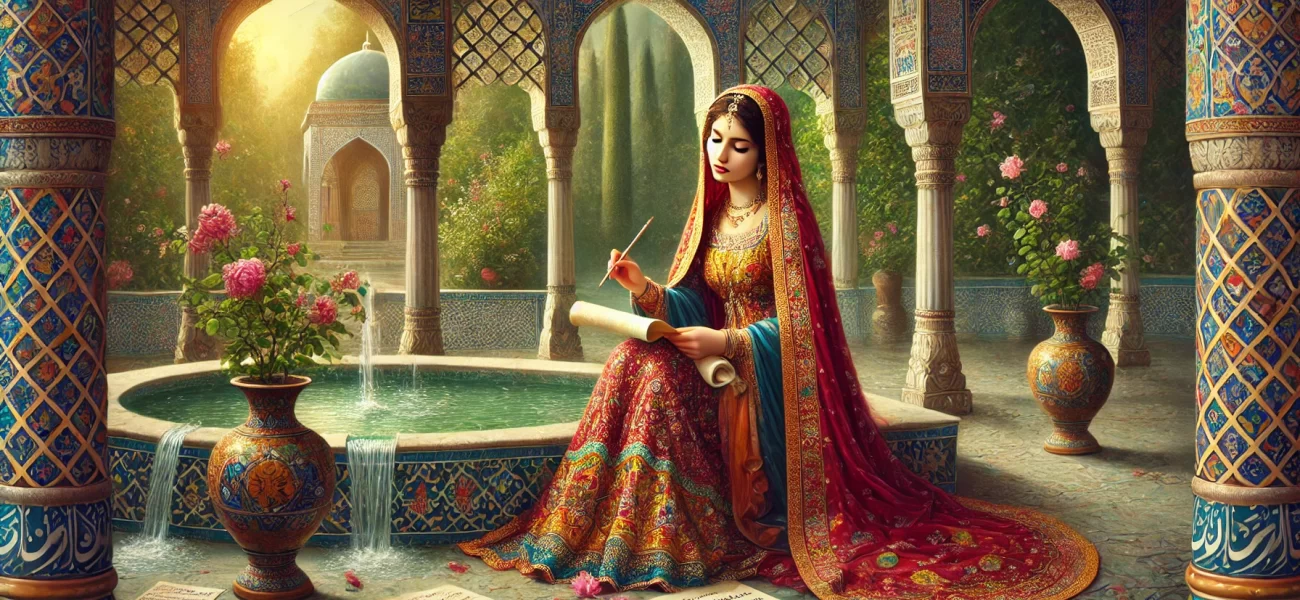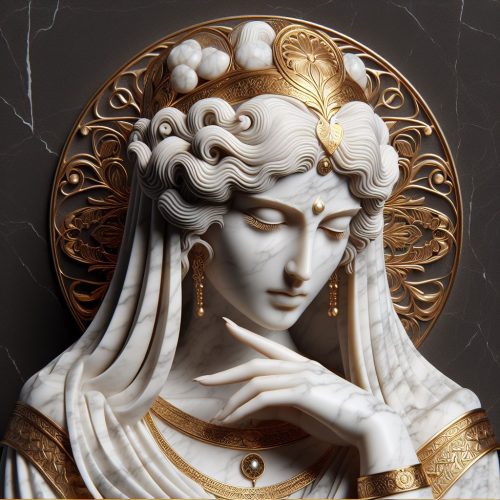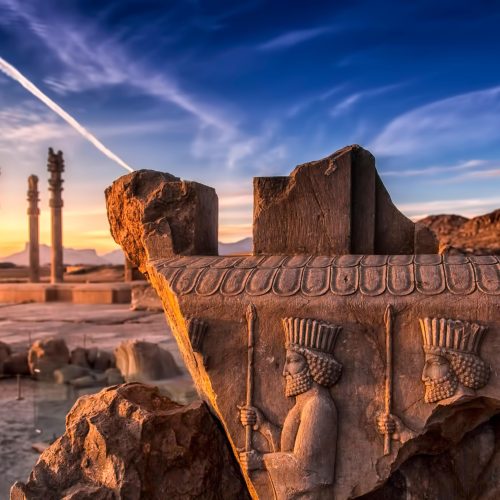By Dr. Soraya Nima, Iranian Scholar and Women’s Rights Activist
“For Rabia, the pen was more than an instrument of writing. It was the sword with which she carved her name into history, the ink of her words flowing like the blood of a thousand women who came before her—voiceless, invisible, but undeterred. And in her poetry, she sang for them all.”
Introduction: A Forgotten Flame in the Cradle of Persian Poetry
In the expansive corridors of Persian literary tradition, where the brilliance of poets like Ferdowsi, Saadi, and Rumi illuminate the mind, there is a softer, but no less radiant, light—a flame that has flickered at the edge of our collective consciousness for centuries. This is the light of Rabia Balkhi, the first woman to write poetry in Persian, and one of the earliest feminist voices to echo across the Persian world. She lived in the 10th century, during the Samanid dynasty, a time when women’s voices were often muted or marginalized. Yet, Rabia’s voice defied these constraints, transcending her immediate environment and the societal limitations imposed upon her gender.
Though her life was brief, cut short by a love that transcended the boundaries of her patriarchal world, her legacy as a poetess, a feminist, and a symbol of resistance remains eternal. To speak of Rabia Balkhi is to evoke the spirit of a woman who was, at once, a poet, a revolutionary, and a martyr of love. Her life stands as a testament to the resilience of women throughout history, who, despite the chains of patriarchy, have found ways to create, to speak, and to transform the world around them.
As we delve into the life and work of Rabia Balkhi, we do more than celebrate her contribution to Persian literature; we also honor the legacy of women who, like her, have written their stories into existence with the ink of resistance.
The Early Life of Rabia Balkhi: Between Power and Constraint
Rabia Balkhi was born into an aristocratic family in the city of Balkh, a cradle of culture and intellectualism in what is now northern Afghanistan. Her family was of Arab descent, having settled in the Persian-speaking region after the Islamic conquests. Despite her privileged background, Rabia’s early life was shadowed by the constraints of her gender. Though she enjoyed the education and intellectual engagement afforded to her brothers, Rabia was, by societal standards, expected to remain in the private sphere, her talents confined to the walls of her family’s home.
But even in this space of limitation, Rabia found ways to defy expectation. Her intellectual curiosity was nurtured by her access to the rich literary and philosophical traditions of the time. Persian culture, deeply intertwined with the Zoroastrian and later Islamic influences, valued poetry as a spiritual and artistic pursuit. For Rabia, poetry became the vessel through which she could express her deepest thoughts, emotions, and critiques of the world around her.
It is said that her brother, Hares, was a military commander in the Samanid court, and Rabia’s proximity to power afforded her a unique vantage point from which to observe the political and social structures of her time. Yet, despite this privilege, Rabia was still subject to the strictures imposed upon her as a woman. She was forbidden from participating in public life, and her love—arguably the most radical form of rebellion in her life—would ultimately lead to her tragic demise.
Her story, like that of many women throughout history, is one of potential stifled by patriarchal control. But within the boundaries set for her, Rabia did not remain silent. Her poetry, infused with love, passion, and intellectual rigor, became her form of resistance—a resistance not only to her own circumstances but to the larger forces of misogyny that sought to silence her.
Rabia’s Poetry: A Dance of Love and Longing
Rabia’s poetry is the heart of her legacy. Her verses speak in a voice that is at once delicate and forceful, personal yet universal. In her work, we hear the music of longing, the sharp edge of critique, and the profound depth of love. But her love was no ordinary love—it was revolutionary.
In the 10th century, Persian poetry was largely the domain of men, and the themes of the time revolved around courtly praise, mysticism, and epic heroism. Women were rarely given space in the public literary canon, and their expressions of love, if allowed at all, were expected to conform to societal norms of modesty and restraint. Rabia, however, shattered these expectations. Her poetry spoke of an unbridled, passionate love—one that was deeply personal and, by the standards of her time, scandalous.
Her poems were written for a man of lower social standing, a slave named Baktash. This love was forbidden, both by societal norms and by her own family, but it was a love that she refused to renounce. Rabia’s verses express the torment of this love, the pain of separation, and the inevitability of her tragic fate. Yet, within this personal narrative, there is also a broader theme of liberation. In loving Baktash, Rabia not only defied her family but also the patriarchal structures that sought to control her body and soul.
Her poems are suffused with the imagery of nature—rivers, gardens, and the changing seasons. Through these metaphors, Rabia connects her personal emotions to the larger rhythms of life and the cosmos, a hallmark of classical Persian poetry. Yet, her voice remains distinctly her own. Her love is not a passive, melancholic lament but an active, fiery force that burns even as it destroys her.
An excerpt of Rabia’s poetry reads:
“They say you are unworthy of me,
That you stand below in rank and station.
But what is rank, if not a prison for love?
What is wealth, but a chain to the heart’s liberation?”
In these lines, we hear the defiance of a woman who rejects the hierarchical structures of her world. Her love, though forbidden, becomes a source of power—a way of reclaiming her agency in a world that seeks to deny her autonomy.
The Tragic End: Love, Betrayal, and Martyrdom
Rabia Balkhi’s life was as tragic as it was inspiring. Her love for Baktash, though passionate and transformative, would ultimately lead to her death. The details of her final days remain steeped in legend, but the core of the story remains consistent across accounts: Rabia’s love was discovered by her brother, Hares, who saw it as a stain on the family’s honor. Enraged by what he perceived as a betrayal of both social norms and familial loyalty, Hares imprisoned Rabia, condemning her to death for the crime of loving beyond her station.
It is said that Rabia was locked in a room with her wrists cut, left to bleed out alone. Yet, even in these final moments, her voice did not falter. According to legend, Rabia used her own blood to write her final poems on the walls of her cell. Her last words, inscribed in the fluid of life itself, were a final act of defiance—a testament to her unwavering spirit.
As her life ebbed away, Rabia’s words remained, immortalized on the walls of her prison and, eventually, in the annals of Persian literary history. In dying for her love, Rabia became a martyr—a symbol of resistance against the forces that sought to control and suppress her. Her poetry, written in the throes of her final moments, became her legacy, a beacon of hope for future generations of women who, like her, would struggle against the confines of patriarchy.
Rabia as a Feminist Icon: The Subversive Power of Poetry
To understand Rabia Balkhi through the lens of feminism is to see her as more than just a tragic figure in a love story. Rabia’s life and work represent a radical challenge to the gender norms of her time. In her poetry, she claimed space for herself in a literary tradition dominated by men, and in her life, she defied the expectations placed upon her as a woman of aristocratic birth.
Rabia’s defiance was not only a personal act of rebellion but also a broader challenge to the patriarchal structures of her society. Her love for Baktash was a rejection of the social hierarchies that dictated whom she could love and how she could express that love. Her poetry, written in a deeply personal and emotional voice, was an assertion of her right to speak, to create, and to define her own narrative.
For centuries, Rabia has been celebrated as a poetess, but her significance as a feminist icon has often been overlooked. In a world where women were expected to remain silent, Rabia used her voice to challenge the status quo. Her poetry, written in Persian—a language that was itself emerging as a literary medium—became a tool for subversion. Through her words, she not only expressed her own desires but also gave voice to the frustrations and struggles of countless women who, like her, lived under the weight of patriarchal oppression.
Rabia’s legacy as a feminist icon is particularly significant in the context of Persian literature, where women’s voices have historically been marginalized. Her work laid the groundwork for future generations of women writers and poets, who would continue to challenge the boundaries of gender and social expectation. In her life and in her death, Rabia stood as a symbol of resistance—resistance to the forces that sought to silence her and to the structures that sought to confine her.
Rabia Balkhi in Contemporary Feminist Discourse
In the contemporary context, Rabia Balkhi’s life and work have taken on new significance. As modern Iranian women continue to fight for their rights in a society where gender inequality persists, Rabia’s story resonates as a powerful symbol of resistance. Her defiance of societal norms, her refusal to be silenced, and her ultimate sacrifice for love make her an enduring figure in the feminist struggle for equality.
Rabia’s poetry speaks to the timeless nature of this struggle. The themes of love, longing, and resistance that permeate her work are as relevant today as they were in the 10th century. Her life serves as a reminder that the fight for women’s rights is not a new phenomenon; it is a battle that has been waged for centuries, with women like Rabia leading the charge.
In recent years, feminist scholars have begun to reexamine Rabia’s legacy, positioning her as a foundational figure in the history of Persian feminism. Her poetry, once read primarily as an expression of personal emotion, is now being recognized for its political and social implications. Rabia’s refusal to conform to the gendered expectations of her time, her rejection of social hierarchies, and her use of poetry as a form of resistance all speak to her role as a feminist trailblazer.
For modern Iranian women, Rabia’s story is both an inspiration and a call to action. Her life reminds us that the struggle for gender equality is far from over, but it also shows us the power of individual resistance. Rabia’s voice, though silenced in her lifetime, continues to resonate through the centuries, reminding us that the pen—and the voice it carries—is a powerful tool for change.
The Eternal Voice of Rabia Balkhi
Rabia Balkhi’s legacy is a complex and multifaceted one. As the first woman to write poetry in Persian, she holds a unique place in the literary history of the region. But her significance extends far beyond her contributions to poetry. Rabia’s life and work represent a radical challenge to the patriarchal norms of her time, and her defiance in the face of oppression has made her an enduring symbol of resistance.
Her poetry, written with a voice that is at once personal and universal, speaks to the timeless nature of the human experience. Through her words, Rabia has transcended the limitations of her own life, becoming a beacon of hope for future generations of women who, like her, seek to defy the constraints placed upon them.
In celebrating Rabia Balkhi, we are not only honoring her place in the pantheon of Persian literature; we are also recognizing her as a foundational figure in the history of feminist resistance. Her voice, silenced by her brother’s hand, continues to speak across the centuries, reminding us that the fight for women’s rights is a battle that has been waged for millennia.
As we continue to fight for gender equality in the modern world, Rabia’s story serves as both an inspiration and a reminder of the power of individual resistance. Her life may have been brief, but her legacy is eternal. Rabia Balkhi, the first poetess of Persian literature, will forever remain the voice of feminine resistance, a flame that will never be extinguished.




